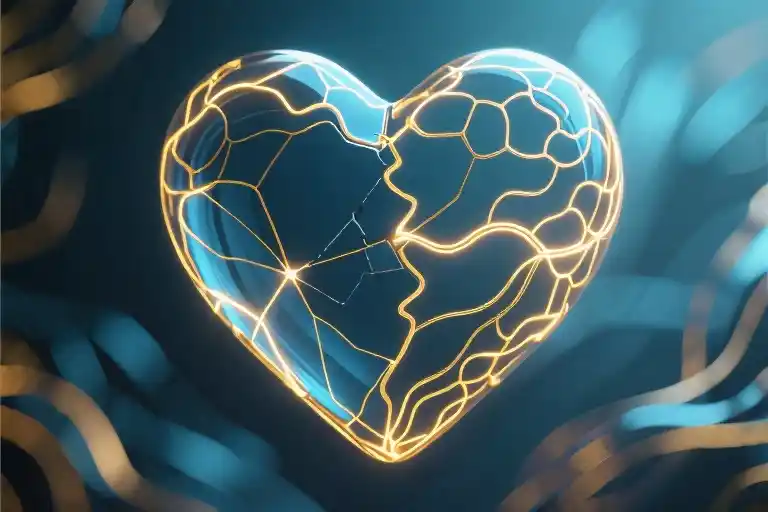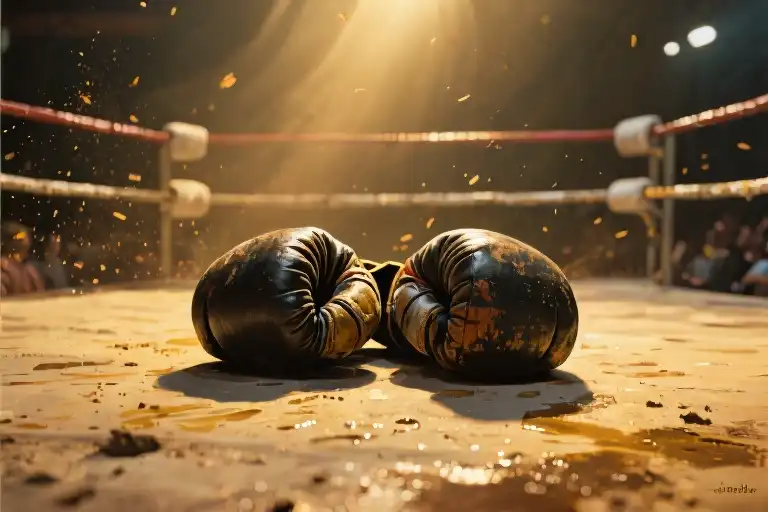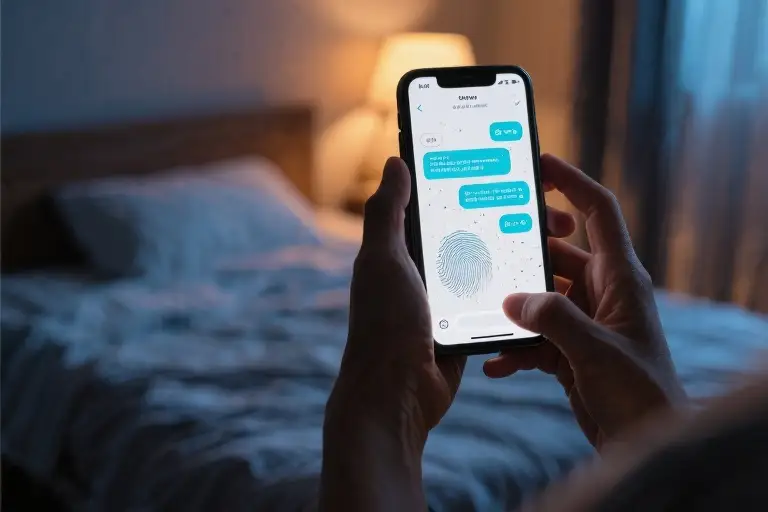“And yet, you love him… you loved him.”
My friend’s words hung in the air between us, sharp and undeniable. The coffee shop chatter faded into background noise as her observation pierced through my carefully constructed armor of anger. She was right. Against all logic, beneath the layers of hurt and betrayal, that inconvenient truth remained: I did love him.
There’s a particular cruelty in loving someone who’s become unrecognizable. It’s like grieving a person who still walks the earth, mourning what existed while facing what remains. The cognitive dissonance of toxic relationship healing isn’t discussed enough—how you can simultaneously cherish the memories while recoiling from the present reality.
I remember tracing the contours of this paradox late at night, staring at my ceiling as trauma bond recovery articles glowed on my phone screen. Why do I still love my ex after everything? The answer came gradually, through tear-stained journal pages and therapy sessions: because love doesn’t vanish when someone changes. It lingers like perfume on discarded clothes, reminding you of a body that no longer inhabits them.
What we rarely acknowledge about letting go of toxic people is that it often requires releasing two entities—the person they became, and the person you believed them to be. The latter is often harder to relinquish. That idealized version lives in your marrow, woven into your nervous system through countless whispered promises and morning kisses. No wonder self-love after breakup feels like performing surgery on your own heart.
Her words that day—”you loved him”—weren’t an accusation but an absolution. They gave me permission to hold two truths: I loved deeply, and that love deserved better. This dual awareness became my compass through the fog of moving on but still in love. It guided me toward the most radical realization—that choosing myself didn’t erase what we shared; it honored what I was worth.
So when people ask how to stop loving someone who hurt you, I no longer search for answers in their absence. The healing began when I stopped asking why I miss my abusive ex and started asking why I accepted less than I deserved. That shift didn’t happen in grand gestures, but in small moments—deleting old photos without hesitation, noticing when my shoulders relaxed at his absence, writing letters I’d never send just to hear my own voice clearly again.
Perhaps this is what they mean when they talk about healing from narcissistic relationships—not the absence of love, but the presence of something stronger. Not how to forgive yourself for loving a toxic person, but understanding that your capacity to love wasn’t the flaw in the equation. The love itself wasn’t wrong; it was simply poured into someone who couldn’t hold it without spilling.
Now when I recall her words—”you loved him”—I can finally agree without caveats. Yes, I did. And that love, however misplaced, however painful in its ending, deserves to be acknowledged without shame. Because the greater truth emerged from its ashes: if I could love someone that much while they diminished me, imagine how fiercely I can love when someone helps me grow.
The Idealized Fragments of Love
There was a time when I could recite every detail about him like a sacred text. The way his eyes crinkled at the corners when he laughed—not the polite chuckle, but the full-bodied laughter that made his shoulders shake. The particular rhythm of his breathing when he’d fallen asleep first, his arm still draped protectively over me. Even the way he’d say “good morning” with that sleepy rasp, as if those two words contained all the warmth in the world.
I loved how he’d absentmindedly hum songs while cooking, always burning the garlic because he got distracted. Loved how he’d defend his terrible movie tastes with theatrical indignation. Loved the version of him that saved injured birds as a child, the man who still softened when talking about his grandmother’s cherry pie.
His hands—those same hands that carefully framed my face to kiss me—were the ones I studied during quiet moments. The callus on his right index finger from holding pens too tightly. The faint scar across his knuckles from some long-forgotten childhood adventure. I mapped these details like constellations, believing they’d always guide me home to him.
The scent of his shampoo lingered in my sheets for days after he left. That particular blend of cedar and something citrusy became my personal comfort smell. I’d bury my face in his hoodies, breathing him in like oxygen. Even now, catching that fragrance elsewhere makes my chest constrict with phantom longing.
We had our language, didn’t we? Silly nicknames that would embarrass me to repeat. Private jokes stacked like inside-out Matryoshka dolls—each layer revealing another shared memory. The way he’d say “I adore you” when passing me the toothpaste, as casually as commenting on the weather, yet it flooded my veins with sunlight every time.
Until.
Until the day his laughter stopped reaching his eyes. Until his protective arm felt like a barricade instead of a shelter. Until “good morning” became a perfunctory grunt tossed over his shoulder as he scrolled through his phone. The humming stopped. The cooking stopped. The tenderness became something rationed, then something rare, then something I had to mine for like forgotten treasure.
I noticed the changes in microscopic detail—the way a gardener notices the first yellow leaf on a beloved plant. His hands still looked the same, but they stopped reaching for mine. His voice still had that familiar timbre, but the words turned unfamiliar, edged with something that made me flinch. The scent was still cedar-and-citrus, but it no longer smelled like home—just like something that used to be.
The cruelest part? The man who’d memorized my coffee order down to the exact number of sugar packets started forgetting important dates. The same lips that whispered “you’re my favorite person” began spitting sentences that landed like shrapnel. He remained physically present while emotionally evaporating, leaving me clutching at the outline of who he’d been.
I wish I could say there was one dramatic moment when the mask slipped. Instead, it was death by a thousand paper cuts—a slow erosion of all the loving details I’d collected. The way his eyebrows drew together when concentrating became a scowl directed at me. His passionate debates turned into dismissive lectures. Even his scent started smelling wrong on my skin, like something that didn’t belong to me anymore.
That’s the particular heartbreak no one warns you about—watching someone transform into a stranger while wearing the same face as the person you loved. Like seeing your favorite book rewritten page by page into something unrecognizable, yet still bearing the same title. You keep reading, hoping the original story will return, until one day you realize you’re holding an entirely different narrative in your hands.
And still, some traitorous part of me whispers: but remember when he—
Yes. I remember. That’s what makes it hurt.
The Stranger Who Was Once Familiar
His scent still lingered the same—that faint trace of sandalwood mixed with morning coffee. His hands still carried those familiar calluses in the exact spots where I’d traced them countless times before. From a distance, nothing seemed different. But then he turned, and suddenly I was staring at a stranger wearing my lover’s face.
The eyes that once softened when they met mine now held a clinical coldness, like a doctor assessing symptoms rather than a partner sharing intimacy. His lips—the same lips that whispered bedtime stories against my temple—now curled downward in permanent disapproval. Even his touch had changed; where fingertips once lingered with affection, they now pointed with accusation.
It felt like waking up to find someone had stolen the weighted blanket I’d been sleeping under during a snowstorm. That sudden exposure to bitter cold, the visceral shock of protection violently ripped away. Only this theft happened in slow motion, each day another thread unraveling until I was left shivering in the remains of what used to keep me warm.
His words became weapons meticulously chosen for maximum damage. Eleven sentences delivered with surgical precision:
‘The idea of you as my woman is making me sick.’
The cruel irony? These verbal bullets came from the same mouth that once formed vows. The same vocal cords that produced ‘I love you’ now manufactured ammunition. The physical consistency made the emotional whiplash more violent—like eating your favorite meal only to discover it’s been poisoned.
This cognitive dissonance is the hallmark of toxic relationship healing. When someone’s appearance stays constant while their essence mutates, our brains short-circuit trying to reconcile the discrepancy. Trauma bonds form precisely because we keep reaching for the original version in the shell of what they’ve become.
That’s why letting go of toxic people requires mourning two losses: the person who changed, and the part of yourself that believed they never would. The familiarity didn’t disappear—it was weaponized. And nothing prepares you for the vertigo of watching love turn into something that leaves frostbite in its wake.
The Moment That Shattered Everything
His words hit me like a physical blow. “The idea of you as my woman is making me sick.” Eleven syllables that unraveled years of trust. Eleven syllables from the same lips that once whispered “I love you” like a sacred promise.
I remember how his mouth used to curve when he smiled at me – that slight quirk at the left corner that made his eyes crinkle. The same mouth that later twisted with contempt when he said those words. The contrast was almost surreal.
The anatomy of heartbreak:
- Then: “You’re my favorite person” (whispered against my hair)
- Now: “You’re pathetic” (spat across the room)
- Then: Hands cradling my face like something precious
- Now: Fingers jabbing the air between us like knives
That moment crystallized something important about toxic relationships – they don’t start toxic. The cruelty comes wrapped in familiarity, delivered by someone who knows exactly where to aim. That’s what makes the words land differently. When a stranger insults you, it glances off. When it comes from someone who once promised to protect you? That lodges deep.
What nobody tells you about healing from emotional abuse is that the sharpest pain isn’t from the worst things they said – it’s remembering the best things they said first. The whiplash between “I’ve never felt this way about anyone” and “I never loved you” does more damage than either statement alone.
Recognition exercise:
- Write down the kindest thing they ever said to you
- Write down the cruelest
- Notice how the same person could hold both capacities
This isn’t about demonizing your ex – that would actually be easier. The real challenge is holding two truths simultaneously: that the love was real, and that the harm was too. That’s the dissonance that keeps so many stuck in the cycle of “why do I still love someone who hurt me?”
Trauma bonds form precisely because of these extremes. The human brain struggles to reconcile tenderness with cruelty from the same source. We keep reaching back toward the good memories, hoping to override the bad ones. But healing begins when we stop trying to reconcile the irreconcilable.
Practical step: The next time you find yourself romanticizing the past, deliberately recall both versions. Not just the sweet nothings, but the cutting remarks too. Love shouldn’t come with whiplash.
The Tearing and The Choice
I loved him. Not the man he became, but the person I once knew—the one whose eyes softened when he looked at me, whose hands held mine like something precious. That version still lives in my memory, untouched by time or cruelty. And that’s the hardest part of healing from a toxic relationship: holding space for both the love and the loss, the before and the after.
When Love Becomes a Ghost
There’s a peculiar grief in mourning someone who still breathes. The man who whispered “I love you” like a prayer now spits words that leave bruises. Same lips, different language. Same hands, different touch. It’s like watching a familiar house burn down—you recognize the outline, but everything inside has turned to ash.
I used to trace the scars his words left, wondering how someone who once built me up could dismantle me so completely. Trauma bonds work like that: they make you ache for the very person who hurts you. The psychology behind it is cruel but simple—our brains cling to intermittent kindness, turning breadcrumbs into banquets.
The Eleven-Word Earthquake
Then came the moment that shattered the illusion. “The idea of you as my woman is making me sick.” Eleven words. That’s all it took to collapse the entire history we’d built. Funny how the mouth that once kissed your tears away can later weaponize saliva.
That’s when I realized: I wasn’t just losing him. I was losing the girl who believed in him—the version of me that loved without armor. Some losses are liberations in disguise.
Choosing Yourself Amid the Wreckage
Here’s what they don’t tell you about self-love after breakup: it’s not a triumphant march. It’s whispering “I matter” while your heart still whispers his name. It’s setting boundaries even when your hands shake. For me, it looked like:
- Writing letters I’d never send (the unsent ones hold the most truth)
- Creating physical distance (no more “just checking” his social media)
- Reclaiming my sensory world (wearing a perfume he’d never recognize)
The paradox? I still love who he was. But I love who I’m becoming more. That’s the turning point—when your future self becomes more real than your past.
The Alchemy of Letting Go
To my friend who said “And yet, you love him,” I say this: Love isn’t the failure. Staying would have been. There’s courage in releasing someone your heart still holds, especially when your mind knows they’ve become a stranger.
If you’re reading this with your own eleven-word wound, here’s my hand in yours: You can miss the memory without inviting the person back. You can honor the love while choosing your peace. Some goodbyes are the bravest love poems we’ll ever write.
The Letter You Need to Write
“And yet, you love him… you loved him.” Those words still echo, don’t they? The painful truth that lingers like perfume on an old sweater – the scent remains even when the person is gone.
Here’s what I want you to know: loving someone who hurt you doesn’t make you foolish. It makes you human. That capacity to love despite the pain? That’s your superpower. But now, it’s time to redirect that energy where it truly belongs – toward yourself.
The Healing Power of Words
Grab a pen (the kind that glides smoothly across paper) and write these words at the top of a fresh page: “Dear Me When I Still Believed…” This isn’t a letter to him. This is a conversation with the version of you that existed before the doubt crept in.
Tell her:
- What you wish she’d known
- How brave she was to love so completely
- That the betrayal wasn’t about her worth
- Exactly how you’ll protect her now
Why This Works
- Externalizes the pain – Seeing words on paper makes abstract hurt tangible
- Reclaims your narrative – You’re no longer just the wounded party, but the author of your healing
- Creates closure – That unfinished feeling? This helps tie emotional loose ends
- Marks progress – Date it. In three months, you’ll reread it and marvel at your growth
The Unsent Letter Technique
Fold this letter and tuck it away somewhere sacred – between favorite book pages, beneath your jewelry box, anywhere but near his old things. The act of writing matters more than rereading. Though when the missing hits like sudden rain, you might unfold it to remember: you’re not grieving the man who left, but the love you thought would stay.
“I do. I did. But…” – let that be your mantra. The contradiction doesn’t need resolving today. Some truths walk hand in hand: you loved, you learned, you left. And that last part? That’s the love story worth telling.





